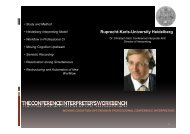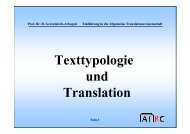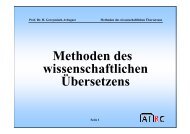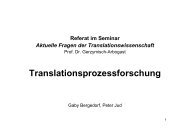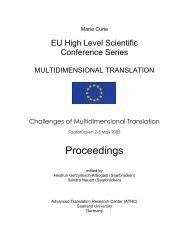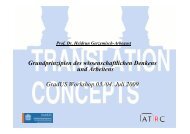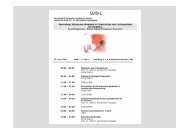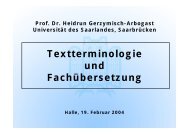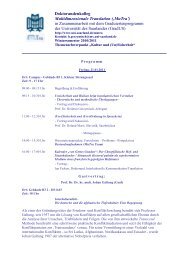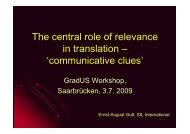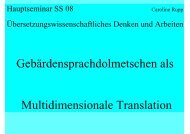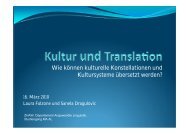Proceedings - Translation Concepts
Proceedings - Translation Concepts
Proceedings - Translation Concepts
You also want an ePaper? Increase the reach of your titles
YUMPU automatically turns print PDFs into web optimized ePapers that Google loves.
I would like to raise five issues:<br />
MuTra 2006 – Audiovisual <strong>Translation</strong> Scenarios: Conference <strong>Proceedings</strong><br />
Yves Gambier<br />
• The current development of audiovisual translation (AVT) research; Where are we<br />
aiming at?<br />
• The need to revise a certain number of concepts in <strong>Translation</strong> Studies (TS), thanks to<br />
AVT<br />
• The challenge of accessibility and reception<br />
• The sociocultural relevance of applied research; AVT should not be seen as a<br />
constellation of problems but as a valuable asset addressing the need for multilingual<br />
and multicultural communication in the international arena<br />
• The contribution of multimodality in the study of AVT, especially in subtitling<br />
2 Piecemeal research<br />
Over the last decade, a few systematic studies have examined the production and reception or<br />
the cultural and linguistic impact of AVT.<br />
AVT has benefited from the rapid development of research interest and of institutional<br />
commitment, especially intralingual subtitling for the deaf and hard of hearing, but the<br />
discipline remains essentially European, and too often limited to case studies on the linguistic<br />
side only, where no sides are taken in the long-running debate on the respective merits of<br />
subtitling or dubbing.<br />
However, the field has gained gradual recognition, but it has not yet definitely established<br />
its place, either within TS or in relation to other disciplines such as semiotics, media studies,<br />
and discourse/pragmatic studies. That may be why AVT is not yet seen as one solution to<br />
internationalization, situating it within the context of power-related, cultural and linguistic<br />
issues in today’s societies. More often than not, our studies are limited to professional<br />
routines, the production process and quality of the output, while too seldom do they<br />
emphasize the decision-making (Why, for instance, are advertisements very often dubbed,<br />
even in a so-called subtitling country? Who defines the translation policy in TV broadcasting<br />
companies and, in particular, who allocates money for translating? etc).<br />
Our field remains too much on the level of isolated descriptions, incurring the risk of<br />
fragmentation, and claiming neutrality through a kind of informative mode of discourse:<br />
Catalans tell us about Catalan TV, Danes about Danish TV, Germans about subtitling for the<br />
deaf and the hard of hearing-impaired in Germany, Portuguese about the same mode for the<br />
same group of people, and so on, as if mediascape were not global, formats were not more<br />
and more international, outsourcing and relocation did not exist, there were no multinational<br />
networks unrestrained by national legislation. Can AVT be considered a positive solution in a<br />
world which is increasingly dependent on multimodal and multimedia products and services?<br />
In the current media scenario, there is an ongoing transfer of power – from the media owners<br />
to the distributors and professionals who manipulate (literally speaking) the multiple codes.<br />
Translators are part of this new group but do not yet realize what this implies or recognize its<br />
full effects. Our field remains fragmented, with a vision limited to certain aspects and shortterm<br />
goals (Gambier 2005). My point here is to emphasize the fragmentation of our research,<br />
basically for one reason: our relative specialization. We tend to be specialist technicians even<br />
among ourselves: subtitlers are not dubbers, interpreters do not practise voice-over, and so on,<br />
and so forth. Furthermore, no one seems to approach the people who decide translation<br />
policies.<br />
92



